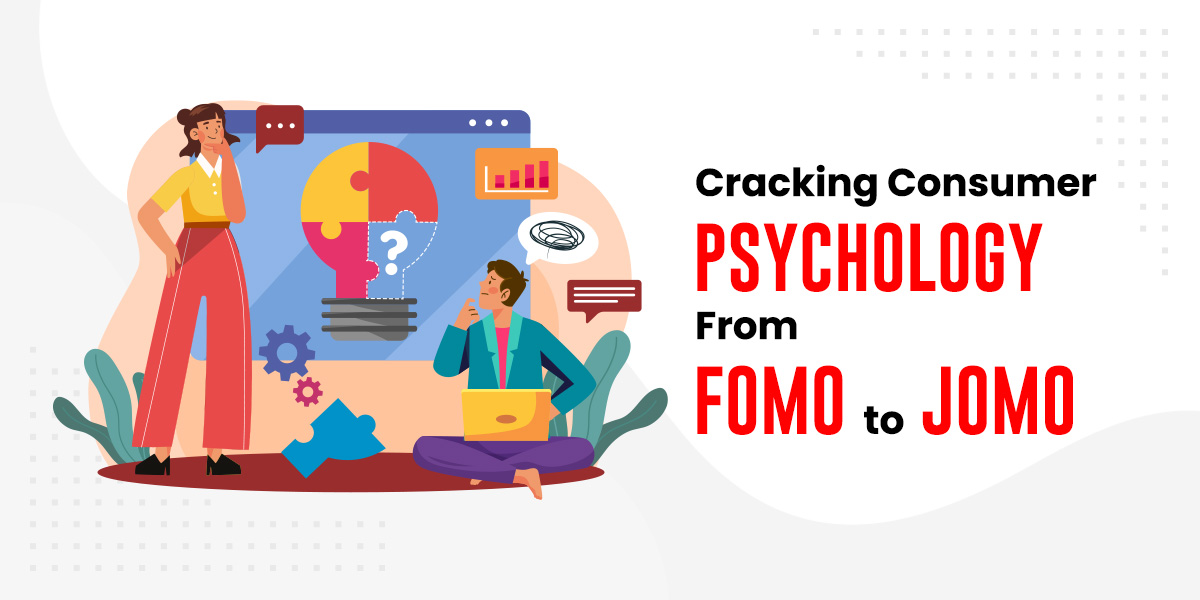Blog Inner Page
From FOMO to JOMO: Leveraging Consumer Psychology in Product Discovery
16/04/2024 & 23:12 PM
|Uploaded By: Admin

In today's fast-paced digital world, consumers are bombarded with endless choices and opportunities. As a result, they often experience conflicting emotions: the Fear of Missing Out (FOMO) and the Joy of Missing Out (JOMO). Understanding these psychological phenomena can be instrumental in product discovery and marketing strategies.
Introduction to FOMO and JOMO
FOMO, or the Fear of Missing Out, refers to the anxiety or apprehension that an exciting or interesting event may currently be happening elsewhere, often triggered by social media updates or peer pressure. On the other hand, JOMO, or the Joy of Missing Out, is the contentment and satisfaction derived from staying disconnected and enjoying one's own company or activities.
Understanding FOMO: Fear of Missing Out
What is FOMO?
FOMO stems from the innate human desire for social acceptance and inclusion. It manifests as a fear of being left out of experiences, events, or opportunities that others are enjoying.
Psychological Effects of FOMO
FOMO can lead to stress, anxiety, and dissatisfaction with one's own life. It often drives impulsive behaviors and excessive use of social media platforms, as individuals constantly seek validation and reassurance from their online networks.
The Rise of JOMO: Joy of Missing Out
Defining JOMO
JOMO represents a shift in mindset, emphasizing the value of self-care, mindfulness, and personal fulfillment. It celebrates the freedom to disconnect, recharge, and prioritize activities that bring genuine happiness and fulfillment.
Benefits of Embracing JOMO
Embracing JOMO can lead to improved mental well-being, reduced stress levels, and enhanced productivity. It encourages individuals to focus on meaningful experiences and relationships, rather than constantly chasing external validation or fleeting pleasures.
Leveraging FOMO and JOMO in Product Discovery
Incorporating elements of both FOMO and JOMO into product discovery and marketing strategies can effectively capture consumer attention and drive engagement.
Creating a Sense of Urgency (FOMO)
Limited-time offers, flash sales, and countdown timers can create a sense of urgency, tapping into consumers' fear of missing out on exclusive deals or opportunities.
Promoting Exclusivity and Authenticity (FOMO)
Highlighting the exclusivity or uniqueness of a product can appeal to consumers' desire to feel special or part of an elite group. Authentic storytelling and user-generated content can further enhance perceived value and authenticity.
Encouraging Mindful Consumption (JOMO)
Emphasizing the benefits of disconnecting and enjoying moments of solitude or relaxation can resonate with consumers seeking to escape the pressures of constant connectivity. Brands can promote self-care routines, wellness products, or digital detox experiences.
Providing Personalized Experiences (JOMO)
Tailoring products or services to individual preferences and interests can enhance the overall customer experience, fostering a sense of satisfaction and fulfillment. Personalized recommendations, loyalty rewards, and exclusive perks can deepen customer loyalty and engagement.
Case Studies: Brands Leveraging Consumer Psychology
Several brands have successfully integrated FOMO and JOMO strategies into their marketing campaigns, driving brand awareness, customer loyalty, and sales.
Tips for Incorporating FOMO and JOMO in Your Marketing Strategy
- Understand your target audience and their motivations.
- Create compelling narratives that resonate emotionally.
- Use social proof and testimonials to build trust and credibility.
- Experiment with different tactics and measure results to optimize performance.
Challenges and Considerations
While leveraging FOMO and JOMO can yield significant benefits, it's essential to strike a balance and avoid exploiting consumers' insecurities or promoting unhealthy behaviors. Transparency, authenticity, and ethical considerations should always guide marketing efforts.
Conclusion
In conclusion, understanding and leveraging consumer psychology, specifically FOMO and JOMO, can be a powerful tool in product discovery and marketing strategies. By tapping into consumers' desires for social connection, validation, and personal fulfillment, brands can create meaningful experiences that resonate deeply and drive long-term engagement.